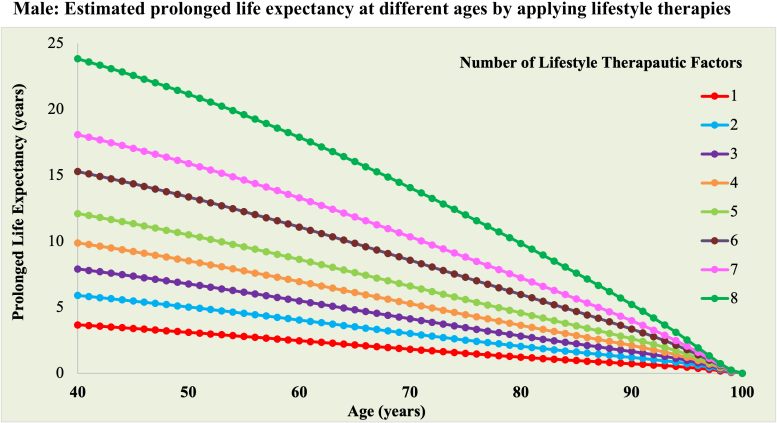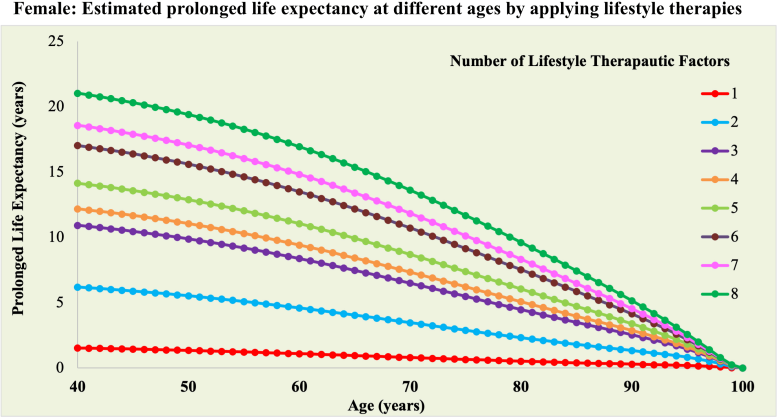
A study of 700,000+ U.S. veterans reveals that eight specific healthy lifestyle habits adopted by middle age can substantially prolong life, emphasizing the role of lifestyle in combating chronic diseases and promoting longevity.
Large study details life expectancy gains associated with healthy lifestyle choices.
A new study involving over 700,000 U.S. veterans reports that people who adopt eight healthy lifestyle habits by middle age can expect to live substantially longer than those with few or none of these habits. The eight habits are: being physically active, being free from opioid addiction, not smoking, managing stress, having a good diet, not regularly binge drinking, having good sleep hygiene, and having positive social relationships.
According to the results, men who have all eight habits at age 40 would be predicted to live an average of 24 years longer than men with none of these habits. For women, having all eight healthy lifestyle factors in middle age was associated with a predicted 21 additional years of life compared to women with none of these habits.
“We were really surprised by just how much could be gained with the adoption of one, two, three, or all eight lifestyle factors,” said Xuan-Mai T. Nguyen, health science specialist at the Department of Veterans Affairs and rising fourth-year medical student at Carle Illinois College of Medicine. “Our research findings suggest that adopting a healthy lifestyle is important for both public health and personal wellness. The earlier the better, but even if you only make a small change in your 40s, 50s, or 60s, it still is beneficial.”
Study Details and Outcomes
Nguyen presented the findings at NUTRITION 2023, the flagship annual meeting of the American Society for Nutrition.
For the study, scientists used data from medical records and questionnaires collected between 2011-2019 from 719,147 people enrolled in the Veterans Affairs Million Veteran Program, a large, nationally representative study of U.S. veterans. The analysis included data from adults age 40-99 and included 33,375 deaths during follow-up.

The estimated impact of adopting different numbers of healthy lifestyle factors on additional years of life expectancy among men as compared to men with none of these habits. While adopting more healthy lifestyle factors at a younger age is associated with the greatest gains in life expectancy, adopting even a few of these factors or adopting them at an older age can still bring significant gains. Credit: VA Million Veteran Program
Overall, the results showed that low physical activity, opioid use, and smoking had the biggest impact on lifespan; these factors were associated with around a 30-45% higher risk of death during the study period. Stress, binge drinking, poor diet, and poor sleep hygiene were each associated with around a 20% increase in the risk of death, and a lack of positive social relationships was associated with a 5% increased risk of death.

The estimated impact of adopting different numbers of healthy lifestyle factors on additional years of life expectancy among women as compared to women with none of these habits. While adopting more healthy lifestyle factors at a younger age is associated with the greatest gains in life expectancy, adopting even a few of these factors or adopting them at an older age can still bring significant gains. Credit: VA Million Veteran Program
Implications and Future Directions
According to researchers, the findings underscore the role of lifestyle factors in contributing to chronic diseases such as type 2 diabetes and heart disease that lead to premature disability and death. The results also help to quantify the degree to which making healthy lifestyle choices can help people reduce their risk of such diseases and live longer.
“Lifestyle medicine is aimed at treating the underlying causes of chronic diseases rather than their symptoms,” said Nguyen. “It provides a potential avenue for altering the course of ever-increasing health care costs resulting from prescription medicine and surgical procedures.”
The estimated gain in life expectancy from adopting the eight healthy lifestyle factors grew slightly smaller with age but remained significant, meaning that adopting healthier habits at an older age can still help you live longer. “It is never too late to adopt a healthy lifestyle,” said Nguyen.
As an observational study, the research does not definitively prove causality, Nguyen noted. However, the findings align with a growing body of research supporting the role of lifestyle factors in preventing chronic diseases and promoting healthy aging.









Not doing something doesn’t seem to fit the definition of a habit. At least three of the “habits” listed are not doing things. Whether the list qualifies as habits or not it is comforting to think there is evidence of such a significant increase in likely lifespan from observing a checklist conducive to an enjoyable lifestyle (in my opinion).
What one earth is “good sleep hygiene” – wearing a diaper or face nappy in bed? I need to know or I won’t sleep a wink worrying.